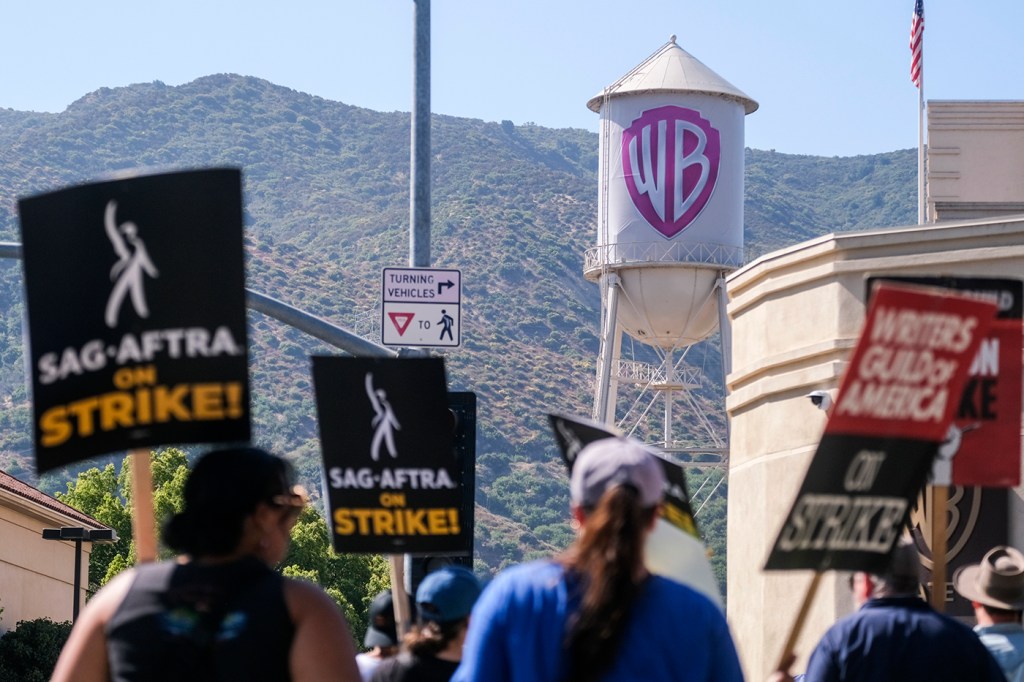Why the writers’ and actors’ strikes are about more than just Hollywood

Hollywood has ground to a halt, as actors and writers are both on strike for the first time since 1960, after negotiations with major studios and streamers hit a standstill.
As of July 13, the 160,000 members of the Screen Actors Guild-American Federation of Television and Radio Artists have joined members of the Writers Guild of America in calling for the Alliance of Motion Picture and Television Producers to meet the needs of workers in an industry that has changed radically since the advent of streaming.
Both unions have their own asks. The writers, for example, want to get rid of the mini rooms that have made the profession much less sustainable and, for most writers, have made the pathway from apprentice to master a thing of the past. But both unions are united in many of their primary concerns: increased pay and residuals, particularly for streaming shows and movies, and the restrictions around the use of artificial intelligence.
Those are issues that go far beyond Hollywood, issues that writers and actors, with their prominent platform, hope will have implications beyond their industry.
“There’s some particulars about writers––mini rooms, etc.––but this is about labor in general, not even just entertainment industry labor,” says Nick Roth, a strike captain with the WGA. “This feels like an important fight for the entire labor movement.”

Watching the picket lines, speeches and contract negotiations happening in Hollywood right now, Seth Harris has a sense of deja vu. A distinguished professor of practice in law and policy at Northeastern University, Harris previously served as President Joe Biden’s top labor adviser and as acting labor secretary under President Barack Obama. He says the tone and demands of the writers and actors go beyond Hollywood and cut to the heart of the growing labor movement in the U.S.
“One of the causes that cuts across all of [these labor movements] is there’s real anger among working people,” Harris says.
Part of that anger comes from the COVID-19 pandemic, during which workers felt they sacrificed their health and well-being for their employers, some of whom made record profits. That includes studios and streamers like Disney and Netflix.
“They just want a fair share of the economic boon that they contributed to producing, and in some cases were responsible for producing,” Harris says.
Culturally, there has been a shift in the U.S. over the last few years, Harris adds, that has led to “much greater support for unions and workers’ causes than there’s ever been.” And in an era of extremely tight labor markets, “workers have more power, and they are able to exercise that power.”
But the WGA and, particularly, SAG-AFTRA are different from most other unions in one key way: “They don’t all have Clooney and Streep.”
Harris says having high-profile actors and writers walking the picket lines is educational for people across the country. It shows the general public that the day players and background actors who make up the majority of SAG-AFTRA have the same concerns as most working people in the U.S. By putting a famous face behind those issues, it raises the profile of workers everywhere.
Javier Grillo-Marxuach, a member of the WGA with a decades-spanning career writing for shows like “Lost,” “Law and Order: Special Victims Unit,” “Charmed” and the third season of Netflix’s “The Witcher,” doesn’t take the idea of a strike lightly. But he says it’s necessary in light of the current state of an industry that dramatically changed when streaming entered the picture. Gone was the network TV model that was driven by ad sales. Instead, it was replaced with a model built by industry disruptors like Netflix on the foundation of subscriptions and subscriber growth.
Now, as studios and streamers look to cut costs and raise prices, the so-called streaming wars might be over, but Grillo-Marxuach says it’s left the industry and its workers broken.
“We’re looking at the outset of a model of late capitalism that is entirely about destroying things in order to sell them off as organ donors, claim profitability, escape in a golden parachute and then find the next worthy enterprise to destroy,” Grillo-Marxuach says. “We seem to really be in a place where capitalism is eating its own tail and devaluing every part of labor underneath it by nickel and diming us out of existence, by nickel and diming a professional class out of existence.”
When it comes to TV, shorter seasons and smaller writers’ rooms that meet for less time before they are dismantled ahead of production has left writers like Grillo-Marxuach feeling devalued by the industry they helped build.
“The writers then are not involved in the production by and large, so the writers are missing out on education that they need in order to better their own work in the future and to do the best work they can for the show,” Grillo-Marxuach says. “The writers are missing out on financial compensation for being involved with production. And the writers are missing out on a real path to success and a real path to a sustainable living wage that you can make as a television writer.”
For actors and writers, pay and residuals have long been major concerns in the streaming era. Working actors and writers could survive for years on the residuals they earned from reruns of network shows. But when it comes to streaming shows like Netflix’s “Orange is the New Black,” actors and writers have begun speaking up about the paltry residuals they earned from some of the streaming era’s biggest hits.
“We’re not going to keep doing incremental changes on a contract that no longer honors what is happening right now with this business model that was foisted upon us,” SAG-AFTRA President Fran Drescher said during a July 13 conference. “What are we doing? Moving around furniture on the Titanic?”
The unions have been publicly sparring with the AMPTP about what they want to get out of these contract negotiations, which at the time of publication had still not resumed.
The AMPTP claims it presented the actors with a deal that included “historic pay and residual increases,” higher caps on pension and health contributions, audition protections and a “groundbreaking AI proposal” that would protect actors’ likenesses and require their consent for “the creation and use of digital replicas or for digital alterations of a performance.”
Drescher called the offer “insulting and disrespectful,” while Duncan Crabtree-Ireland, SAG-AFTRA’s chief negotiator, alleged that the AMPTP’s AI proposal included allows studios to pay a background actor for one day of work during which they could scan and use their likeness in perpetuity without consent.
The AMPTP pushed back, stating that the use of a background actor’s digital likeness would be restricted “to the motion picture for which the background actor is employed.”
The discussion around AI is a key issue for both unions. It’s also one of the more novel ways the Hollywood strikes could have an impact on the labor movement as a whole.
The WGA has historically had a good track record when it comes to figuring out which technology is worth striking over. In 1980, the WGA went on strike over residuals for home media; in 2007, they went on strike to secure jurisdiction over new media and residuals in a limited capacity for digital distribution.
But Roth argues AI has even broader implications.
“The VCR didn’t reshape every sector of American life in the way that AI has the potential to,” Roth says. “But it does feel like we’re the tip of the spear on this, the actors even more than the writers because they have even more at stake with AI, with their likenesses and scanning.”
Grillo-Marxuach, like many other writers, is concerned that the studios will use AI to generate “really, really bad scripts” and then hire a writer to rewrite that script for less than it would cost to have them write an original script.
But he’s also more accepting of the technology than some in the guild, as long as writers are involved in how it gets used.
“If we look at AI right now not as an object of fear but as a tool that we can define, then I don’t see why we can’t coexist with it and use it to our advantage,” Grillo-Marxuach says. “But I think we need to be proactive about that.”
Harris notes that other unions, like the NewsGuild, are likely keen to see how AI limitations are hammered out in the final deal.
“I think a lot of people are going to pour over those sections of the collective bargaining agreements to see how the unions worked it out with the studios, but it won’t be a complete answer to anybody else’s question,” Harris says. “It’ll be an opening answer.”
As for what happens next with the negotiations, Harris anticipates a deal is still a long way off for both unions.
“The corporate studios are really putting their fall and winter at risk now,” Harris says. “They’re putting maybe their whole 2024 production season at risk. It’s just a question of how much that risk they’re willing to bear. I think it will go on a while longer, but I expect the negotiations are going to start again fairly soon.”
Cody Mello-Klein is a Northeastern Global News reporter. Email him at c.mello-klein@northeastern.edu. Follow him on Twitter @Proelectioneer.






